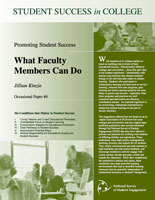Best Practices in Education: Student Success - A Critical Lens
Fostering student success
Creating conditions that foster student success in college has never been more important. Research shows that as many as four-fifths of high school graduates will enroll in some form of post-secondary education. Students must be prepared to live in a world that is facing increasingly complex social, political, and cultural issues. Yet at the same time, the ability of public higher education to enroll, accommodate, retain, and graduate these students has been handicapped in critical ways.
Collaborative learning activities, hands on training, real-world application, service-learning experiences, and capstones.
This conflict has caused an increase in dialogue focused on innovative approaches to teaching, learning, and strategies that foster student success. Coupled with the irrefutable fact that people who complete a post-secondary degree or certificate program do better in every area of their lives, student success is a hot topic that deserves consistent, reoccurring evaluation through an ongoing investigation of high-quality practices that promote learning, retention, and graduation.
Crafting practices towards outcomes that matter most

In an article entitled, "Promoting Student Success, What Faculty Members Can Do," leading author on college student success, Jillian Kinzie, presents powerful ways that faculty can support successful outcomes for students. Beginning with the end in mind, Kinzie encourages faculty members to intentionally craft policies and practices that channel student's energy directly to the types of outcomes that matter most to learning. Some such examples include collaborative learning activities, hands on training, real-world application, service-learning experiences, and capstones. Above all, Kinzie states that the most important ingredient to student success is widespread, unwavering commitment to enhance student learning.

